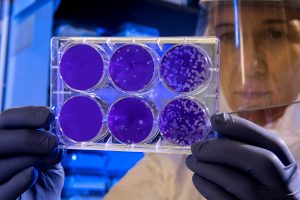
Implication of Novel Coronavirus (2019-nCoV) on Food Processing
Dr Andreas Klieber – Managing Director QAPartners

The current Novel Coronavirus (2019-nCoV) crisis is heavily focused on medical intervention, and rightly so. Containing the outbreak and preventing further spread is the highest priority. It should also be noted that there are still many unknowns about this virus.
There are, however, also some things known by now including that it may transmit from human to human before symptoms occur, that it is largely genetically similar to the SARS-CoV (Severe Acute Respiratory Syndrome coronavirus) and that it may survive in human faecal matter.
From a food safety point of view, this leads to a number of considerations regarding the potential risks to raw materials and foods associated with the Novel Coronavirus (2019-nCoV).
-
The survival of Novel Coronavirus (2019-nCoV) in human specimens is still being researched, but it appears to survive in faecal samples. Research on SARS-CoV indicates that this virus is relatively hardy and survives in serum, sputum and faeces for at least 96 hours. In urine, it could remain alive at least 72 hours with a low level of infectivity. (Duan et al., Stability of SARS coronavirus in human specimens and environment and its sensitivity to heating and UV irradiation. (Biomed Environ Sci. 2003 Sep;16(3):246-55.)
-
Therefore, excellent personal hygiene practices are required to limit the risks of food and raw materials to human pathogens including viruses. This is extensively addressed in modern food safety systems and includes focus on handwashing, suitable toileting facilities, personal protective equipment (PPE), exclusion of food handlers with symptoms of illness including sore throats, coughs and fever, return to work sign off by a qualified doctor and so on.
-
If alcohol-based sanitisers are used following hand washing, ‘ethanol, the most common alcohol ingredient, appears to be the most effective against viruses’, with 95% ethanol being more effective than 80% for hardy viruses such as Hepatitis A. WHO formulations I and II (ethanol-based and isopropanol-based respectively) were effective against SARS-CoV, and Middle East respiratory syndrome coronavirus (MERS-CoV). (Gold N.A. and Usha A., Alcohol Sanitizer, updated December 16, 2019, accessed 3/02/2020)
-
Research on SARS-CoV showed that these viruses stayed stable at 4 °C and at room temperature (20 °C) for at least 2 hours on a range of surfaces and in water. (Duan et al., Stability of SARS coronavirus in human specimens and environment and its sensitivity to heating and UV irradiation. (Biomed Environ Sci. 2003 Sep; 16(3):246-55.)
-
SARS-CoV were inactivated by heat treatments of 90 minutes at 56 °C, 60 minutes at 67 °C or 30 minutes 75 °C. UV irradiation for 60 min of the virus in culture inactivated it. (Duan et al., Stability of SARS coronavirus in human specimens and environment and its sensitivity to heating and UV irradiation. (Biomed Environ Sci. 2003 Sep; 16(3):246-55.)
The data points at some food industries that may be more exposed to this threat than others. Any foods that are not cooked to a significant degree are more at risk; this is even the case for foods processed with a ‘ Listeria -cook’ of 72 °C for 2 minutes. Also, chilling and most likely freezing is not readily going to destroy this virus and therefore chilled and frozen foods sourced from major outbreak zones should be risk assessed.
The above information gives us an indication of how Novel Coronavirus (2019-nCoV) may behave in human hosts and the environment and specific interventions that could be taken. Much of these are already considered and implemented in modern food safety systems.
However, if you would like a professional review of your food safety systems in light of this emerging issue, QAPartners can assist you through an independent, confidential review of your business’ preparedness.
Disclaimer: Please note that the considerations in this paper are of a general nature only and should not be seen as a recommendation to act in specific ways.
For more information, please contact QAPartners – info@qualityassociates.com.au; +61 1300 737 193 or visit qualityassociates.com.au